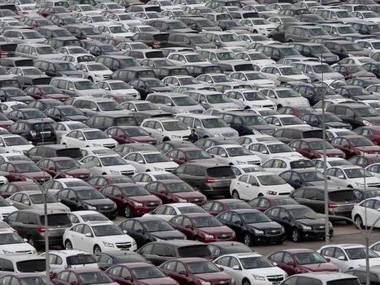The ongoing debate on the record slowdown in car sales has so far largely been centered around the hypothesis that this is one of the obvious consequences of a severe economic slowdown. Auto sector laments that consumer confidence in the industry has logically taken a hit like in most other sectors in recent months. They argue that the government needs to urgently act with a set of measures including
cutting Goods and Services Tax (GST), promoting exports and so on. These measures, indeed, are important in the present context. But it is also important to remember that there is another, equally critical, side to this argument. That is, it’s time auto companies, especially carmakers, to wake up too and smell the coffee on the changing market reality to tide over the crisis. They can’t be just sitting ducks. The following aspects are critical: Firstly, it is a fact that most of the car companies made merry in the past two decades when the economy was booming. From the days of Maruti 800 in the 90s, the industry has expanded much in the following three decades. The carmakers made good money during the boom period by tapping into newer markets (entry-level hatchbacks targeting first-time car buyers in the). But during economic downturns, they have been reluctant to cut high prices. [caption id=“attachment_5622651” align=“alignleft” width=“380”] Representational image. Reuters[/caption] Prices have only gone up even for the entry-level cars over the years.
Sales slump of this nature warrants automakers too think out of the box on the pricing front. If the carmakers show the willingness to cut prices by say, 40 percent, at least as a short-term measure, demand can be revived to an extent. Secondly, a question arises—isn’t the quality and safety features offered by Indian carmakers on entry-level, mid-level car segments still lower than what customers in other markets get—especially the basic safety features? There have been consumer complaints that what they get is not on par with what they pay when compared with what same carmakers offer to customers in other developed markets in the comparable segments. This crisis is a good opportunity for carmakers to introspect and see if they have been taking the Indian customer for granted vis-à-vis other markets. Thirdly, there have been a lot of debates on the comment of Union Finance Minister Nirmala Sitharaman with respect to change in
‘millennial mindset’ and its impact on car sales slowdown. While it may be true that this is only one of the many factors that led to the current situation, the car companies cannot laugh it off too. This aspect needs to be studied well and business strategies need to get adjusted accordingly. There is, of course, a case for the younger generation to go for rented cars than owning one. Carmakers may be realising this already and working to adapt to this change. One example is the recent announcement from Mahindra and Mahindra that it will buy a 55 percent stake in ride-hailing firm Meru Cabs, in a bid to get a pie in the growing market for shared mobility. Carmakers can own and operate rented car services thus helping these companies to push sales in this channel. Fourthly, the transition from BS-IV to BS-VI could be another factor carmakers need to acknowledge. This could have partly contributed too to the mess right now. There may be a section of potential buyers who would want to wait out for another six months to buy BS-VI cars. The carmakers have been pushing for the extension of the BS-VI deadline but perhaps need to adjust their production accordingly. Fifthly, this is also a good time to push for auto companies to invest in the R&D department on electric vehicles (EVs),
affordable ones . There is a largely untapped market for affordable electric vehicles. But to begin the switch, customers need to be taken into confidence about the quality and maintenance of new era cars. As this Mint article highlights, carmakers are already preparing for the shift but there is a long way before
EVs become acceptable for Indian car buyers. This is a good time to work on the strategies. The current economic slowdown cannot be reversed overnight; it will take bold steps and incentives exercised over a period of time before things look up again. But carmakers cannot be sitting ducks waiting for a savior to do this. Merely lamenting on the economic slowdown and waiting for the government steps (tax cuts, incentives) won’t be a good idea. Carmakers too need to wake up and sense the new market reality.
This crisis is a good opportunity for carmakers to introspect and see if they have been taking the Indian customer for granted vis-à-vis other markets.
Advertisement
End of Article


)

)
)
)
)
)
)
)
)



